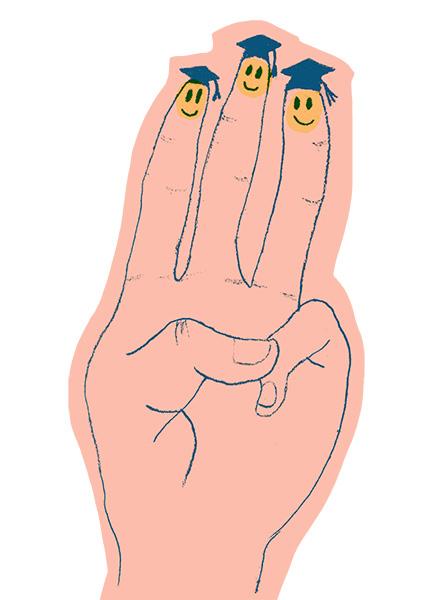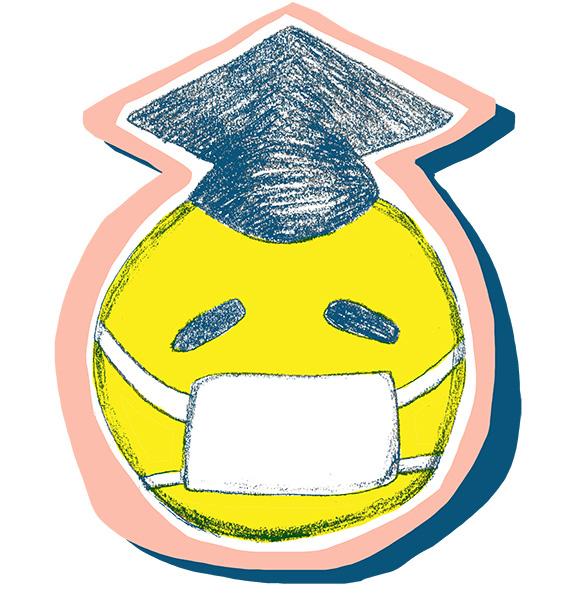
11 minute read
21
thing that seniors have been looking forward to for a long time. I don’t think it’s wrong to want something better than a virtual graduation, even if such a thing is futile.
While there are larger,
Advertisement
life-saving concerns,
isn’t it understandable
that students might be
upset that life isn’t
turning out like we
thought it would?
More than anything, the backlash against vir- tual commencement is a sign of even larger frus- trations. That’s okay. People will tell you that being disappointed about things you’ve looked forward to is to ignore the bigger issues. While there are larger, life-saving concerns, isn’t it understandable that students might be upset that life isn’t turning out like we thought it would?
We can make graduation whatever we want it

to be. As long as people are kept safe, there are no rules. Perhaps virtual commencement seems like the best option to you. That’s great! I’m glad you’re finding something to look forward to. But for those who don’t like that option, there should be something else to be excited for. As we all know, there’s so little of that these days.
Personally, I was recently sent an email from the honors college asking what sort of virtual cer- emony I would like. One of the options available was to send in a video of myself standing up from a chair, just like in real graduation, to be broadcast during the ceremony. It was depressing to think about, and I’m someone who doesn’t even care much whether I have a graduation or not. Virtual commencement is, at its very core, disappointing and sad. Imagine how sad it is for students who have been looking forward to that ceremony!
For this reason, I endorse ASPSU’s idea to have multiple options available to students. I don’t think virtual commencement should be the only option, even if I don’t think it should be cancelled either. Instead, virtual commencement should be opted into if you believe it’s the best option. Oth- ers should still be able to hold smaller ceremonies later on and, I believe, a full ceremony either next year or in the fall should be an option as well. Seniors worked hard to get where they are and although a Moda ceremony won’t be happening this year, we should be able to choose how we get to celebrate.

POSTPONE, DON’T CANCEL

Why the class of 2020 deserves a real graduation ceremony by Claire Golden illustrations by May Walker
Like many of my fellow graduating seniors, I was distressed when I received the email from PSU announcing that graduation would be virtual this year. Don’t get me wrong: I knew we wouldn’t be having our graduation ceremony in June at the MODA Center. It would be irresponsible to bring so many people together during a pandemic, when it’s more important than ever to be following the CDC’s social distancing guidelines. I’m not encouraging PSU to break those rules. However, I am insisting that PSU listen to its students and postpone the 2020 Commencement Ceremony rather than holding a virtual ceremony.
These four (or five, six, or thirty-five) years haven’t been easy. Everybody has faced their own struggles on their way to earning their degree. PSU is known to have unconventional students, whether they be working students, parents going back to school, or commuters. Everybody has their own story and everybody has overcome their own battles. I can only speak from my own experience, so that’s what I’m going to do: share my story with you in the hopes that it will encourage PSU to do the right thing and give the class of 2020 a real graduation ceremony.
PSU was painfully unhelpful during my health problems in my junior year. They refused to accomodate me in the ways that I needed to succeed. Doctors couldn’t figure out what was wrong with me, but I was having excruciating stomach pains that left me unable to keep food down. I spent most evenings curled up on the bath20 OPINION

room floor just wanting the pain to go away. Because I couldn’t eat, I lost twenty pounds. Nobody could figure out what was wrong. I had radioactive medication injected through an IV to see if it was my gallbladder, then an upper endoscopy to see if there was something wrong with my stomach.
During this process, I continued to take a full course load because I was determined to get my degree. I didn’t want my GPA to suffer because I was missing classes, so I registered with the Disability Resource Center to ask for flexible attendance and was shocked to discover that this was not an option. I wasn’t missing class in favor of my own amusement—
I was asking for leniency because I could not walk from my bathroom to my bedroom, let alone take the bus downtown.
But the DRC offered absolutely no help or sympathy. Luckily, my professors stepped up and helped, sending me classwork at home and understanding when I missed class. I maintained my GPA and a full course load, no thanks to PSU admin. Getting to graduation has been a long, uphill battle. PSU didn’t let me go virtual when I was too sick to get out of my bed, showing that they don’t truly care about their students’ well-being. Why do they get to go virtual for our graduation just because it’s convenient for them?
The number of petitions online demanding that PSU reschedule the ceremony shows that hundreds of other students feel the same way. A petition on Change.org titled
“POSTPONE [sic] the Portland
State University spring 2020 graduation” has over 1,100 signatures in the month it’s been active. This petition states that students “will not stand with the fact that PSU has no intention of rescheduling [their] graduation, with no clear input from graduating students themselves or faculty. They have instead made it clear that this decision would be made for [students], not with [students].” It calls for PSU to work with the student body to postpone the ceremony.
The announcement of virtual graduation garnered an overwhelmingly negative response on PSU’s Facebook page. In the comments section, graduating seniors call this
decision a “slap in the face” and say that PSU is not listening to its students. In contrast, Southern Oregon University is postponing commencement. In response to the unhappy comments on the virtual graduation announcement, PSU is replying with a canned response stating that they will “continue to pass along comments to...campus leadership. You may also visit https://www.pdx.edu/ commencement and fill out the feedback form.” Students are understandably frustrated by this dismissive response and the fact that campus leadership has demonstrated an unwillingness to listen to their students.
PSU states on their Commencement Ceremony Information page that they “are not able to postpone commencement mainly because it is not possible to know how long coronavirus restrictions will last, which puts any future bookings of large venues in doubt.” But this is like saying that since the future is uncertain, there’s no point in trying. Our graduating class deserves better. Surely facilities exist that could house a ceremony, like the newly renovated Viking Pavilion or even the Park Blocks themselves. Smaller ceremonies could be held for each individual college rather than having six big ones like normal. It’s true that it will be logistically challenging to find a place to hold commencement, but between all the powers that be and the combined knowledge of the student body, I’m confident that a solution exists. If nothing else, the 2020 class could walk with the 2021 class next June. Any of these options would be preferable to sitting in front of our screens watching a glorified PowerPoint presentation and hearing our names read. To add insult to injury, PSU includes links on their Virtual Commence- ment Page to pictures of past graduation events, as if to show everyone what they will be missing.
It’s true that we, as the graduating class of 2020, are angry about this decision. But more than that, we are sad. Sad because after all this work, our accomplishment will not be recognized. Sad because our friends and family will not be able to celebrate with us. Most of all, sad because PSU has shown, yet again, that they only care about their students when it’s convenient for them.

Neoliberalism Is the Disease
How the ideology behind America’s economy has failed the most vulnerable

“Neoliberalism” is a notoriously slippery turn of phrase, one that has been twisted this way and that by so many different groups with so many different agendas as to become almost meaningless. Let’s begin by defining what the word “neoliberalism” means in the context of this essay. ...In particular, neoliberalism is often characterized in terms of its belief in sustained economic growth as the means to achieve human progress, its confidence in free markets as the most-efficient allocation of resources, its emphasis on minimal state intervention in economic and social affairs, and its commitment to the freedom of trade and capital. — Encyclopedia Britannica
In his book, Knocking the Hustle: Against the Neoliberal Turn in Black Politics, Political Science and Africana Studies professor Lester Spence defines neoliberalism as “the general idea that society works best when the people and the institutions within it work...according to market principles.” He criticizes the rise of “human capital,” the idea that each person must think of themselves in entrepreneurial terms. He distills this theory to one simple phrase: “I’m not a businessman; I’m a business, man.” In short, neoliberalism is an ideology which favors a reduction of the state and an expansion of the market into every aspect of life; which believes free-market capitalism produces the most efficient allocation of resources, and believes public spending inherently restrains growth and innovation.
It’s killing America.
As I’ve written before, the American social safety net is catastrophically broken, passing most of the burden off of the state and onto individuals. The coronavirus pandemic has revealed just how broken the system is. Recognizing the problem, however, will do little good if we don’t recognize the ideology behind it. The slow but deliberate retrenchment of New Deal policies in the past half-century has been driven by neoliberalism. Activist Naomi Klein, in her book This Changes Everything, wrote that “the three policy pillars of the neoliberal age” are “privatization of the public sphere, deregulation of the corporate sector, and the lowering of income and corporate taxes, paid for with cuts to public spending…”
Neoliberalism is often associated with the free-market policies of Ronald Reagan and U.K. Prime Minister Margaret Thatcher, but it has become a mainstream ideology today, embraced by members of both parties in the United States. Its influence pervades every aspect of American life. The coronavirus pandemic, a once-in-a-lifetime crisis, is revealing the cracks in what was already a fundamentally flawed system.
Under neoliberalism, there is no collective good, only individual benefit. Consider Margaret Thatcher’s quote, “...there’s no such thing as society. There are individual men and women and there are families.” This sentiment explains so much about contemporary American society. The neoliberal myth of “rugged individualism” at the expense of collective action has seeped into every facet of our lives. We don’t structure our society to look out for the most vulnerable. We barely even give them the time of day. Instead, the credo of contemporary society seems to be, “F*ck you, I got mine.”
In this system, the free market dictates all aspects of life, not just the economic sphere. The government has little to no role to play in ordinary people’s lives in a neoliberal society. Before the neoliberal age, the quintessential defense of collective action came from FDR’s second inaugural address: “The test of our progress is not whether we add more to the abundance of those who have much; it is whether we provide enough for those who have too little.” Compare this to Ronald Reagan’s first inaugural address, where he stated “government is the problem,” or Bill Clinton’s famous 1996 declaration that “the era of big government is over.”
Since the rise of neoliberal ideology, government is no longer seen as a force for good; it has become a bogeyman that tramples freedom and breeds inefficiency. It’s no surprise, then, that in the midst of the greatest collective action problem since World War II, the U.S. gov

ernment is failing miserably. Some states are threatening to cut off unemployment benefits if workers are afraid to show up. Only about 6 million tests have been carried out in a population of over 300 million. 35 million Americans could lose their health insurance due to the pandemic. This is not the work of a well-functioning government.
To successfully respond to a global pandemic, we need a global, coordinated response. Everyone must stay home as much as possible to stop the spread. That requires sacrifice on the part of everyone, especially the most vulnerable who already live in marginalized communities. The issue with our response can be summed up like this: if you don’t make it economically possible for people to stay home, they won’t. Numerous stay-at-home protests have been organized in recent weeks, and though they do not represent a majority of the public, we should pay attention to them. Philip Campbell, one protester in Michigan, told The New York Times, “This was very much about working people and our livelihoods and not wanting to be bankrupt and go










